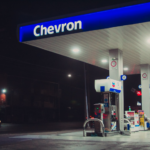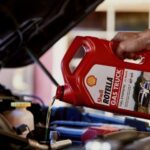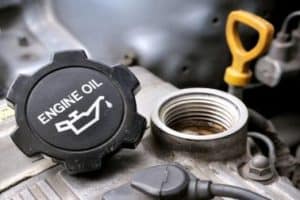Shell is a well-known gasoline brand that is available at gas stations across the United States. Many drivers wonder if Shell gas is good for their vehicles, and if it is worth the extra cost compared to other gasoline brands.
Shell gasoline is a member of Top Tier Gasoline, a set of standards for gasoline quality that exceeds the minimum requirements set by the Environmental Protection Agency (EPA).
Top Tier gasoline contains a higher level of detergent additives that can help prevent carbon buildup and deposits on the intake valves and fuel injectors in modern engines.
These deposits can reduce engine performance and fuel efficiency over time, so using Top Tier gasoline may help maintain engine health and performance.
Overall, Shell gas is a high-quality gasoline that meets Top Tier standards and may provide benefits for vehicle performance and longevity.
However, it is important to note that all gasoline brands sold in the United States must meet minimum EPA requirements, so even non-Top Tier gasoline should be safe and effective for most vehicles.
Ultimately, the decision to use Shell gas or another brand may come down to personal preference, availability, and cost.
Is Shell Gas Good?

Shell is one of the most popular gasoline retailers in the world. But is Shell gas good for your vehicle? The answer is yes. Shell gas is a high-quality fuel that meets or exceeds industry standards.
In fact, it is a member of the “Top Tier Gasoline” group, which means it contains premium additives that can help improve engine performance and efficiency.
When it comes to choosing a gasoline brand, the quality of the fuel matters. Not all brands of gas are created equal. Generic or no-name brands may be cheaper, but they may not meet the same minimum industry standards as major brands like Shell.
Top Tier gasoline brands like Shell, Mobil, Chevron, Costco, and Sinclair use additives in their fuel mix to enhance engine performance and extend engine life.
Shell gas is infused with premium additives that are designed to help keep engines clean and running smoothly. These additives can prevent the buildup of harmful deposits in the engine, which can cause engine knock, reduced fuel efficiency, and other problems.
In addition to its high-quality fuel, Shell also offers a range of other services and products to help keep your vehicle running smoothly.
These include oil changes, tire rotations, and other routine maintenance services. Shell gas stations are also typically well-maintained and offer a range of convenience items for drivers on-the-go.
Overall, Shell gas is a reliable and high-quality fuel that can help keep your vehicle running smoothly and efficiently. While it may be slightly more expensive than generic or no-name brands, the benefits of using a Top Tier gasoline brand like Shell are well worth the extra cost.
Additives in Shell Gas
Shell is one of the leading providers of gasoline in the world, serving millions of customers every day. One of the reasons behind its popularity is the quality of gas it offers. Shell uses a unique blend of additives in its gasoline that helps to improve engine performance and extend engine life.
Shell’s gasoline contains a blend of detergents, friction reducers, and corrosion inhibitors that work together to keep the engine clean and running smoothly. These additives prevent the buildup of dirt and deposits in the engine, which can lead to reduced fuel efficiency and engine performance.
Shell’s detergents help to clean the fuel injectors, intake valves, and combustion chambers, which can improve fuel economy and reduce emissions. The friction reducers in Shell’s gasoline help to reduce wear and tear on the engine, which can extend engine life.
The corrosion inhibitors in Shell’s gasoline help to protect the engine from rust and corrosion, which can also extend engine life.
Shell is committed to providing high-quality gasoline to its customers, which is why it uses a unique blend of additives in its gasoline. The company’s gasoline meets the Top Tier standards for detergent additives, which means that it contains a higher level of detergents than regular gasoline.
Top Tier gasoline is recommended by many automakers because it helps to keep the engine clean and running smoothly.
In summary, Shell’s gasoline contains a blend of detergents, friction reducers, and corrosion inhibitors that work together to keep the engine clean and running smoothly.
The company’s gasoline meets the Top Tier standards for detergent additives, which means that it contains a higher level of detergents than regular gasoline. Shell’s commitment to providing high-quality gasoline to its customers makes it a popular choice among drivers.
Impact on Engine Performance
Shell gas is a member of the Top Tier Gasoline group, which means it has a higher level of detergents and additives than regular gasoline. These detergents and additives help to keep the engine clean, which can improve engine performance over time.
As per Shell’s website, one of the main benefits of using Shell gas is that it can help to improve engine cleanliness. Over time, engines can become clogged with dirt and debris, which can lead to reduced performance and increased emissions.
Shell gas has its own patented cleaning system that helps to actively clean fuel injectors and intake valves, which can help to improve engine performance and reduce emissions.
In addition to improving engine cleanliness, Shell gas can also help to improve engine performance by providing better fuel economy. When an engine is running more efficiently, it requires less fuel to produce the same amount of power. This can help to save money on fuel costs over time.
Overall, using Shell gas can have a positive impact on engine performance. By providing better engine cleanliness and improved fuel economy, Shell gas can help to keep the engine running smoothly and efficiently.
Carbon Deposits and Shell Gas

Carbon deposits, also known as deposits or carbon buildup, can cause problems in a vehicle’s engine, including reduced fuel efficiency and power. Shell Gasoline is known for its ability to prevent carbon deposits from building up in engines.
Shell V-Power NiTRO+ Premium Gasoline is designed to provide unbeatable protection against carbon deposits. The build-up of deposits in fuel injectors can have a disruptive effect on the spray into the combustion chamber, meaning your engine is no longer operating under optimum conditions.
Shell V-Power NiTRO+ protects against future buildup of carbon deposits, providing unbeatable protection against corrosion and wear and friction.
Shell Gasoline contains a patented cleaning system that helps to prevent carbon deposits from forming in the engine. This cleaning system helps to keep the engine running smoothly and efficiently, which can lead to improved fuel economy and performance.
In addition to its cleaning system, Shell Gasoline is also formulated with advanced additives that help to protect the engine from wear and tear. These additives help to keep the engine running smoothly, reducing the risk of damage and prolonging the life of the engine.
Overall, Shell Gasoline is a great choice for drivers who want to keep their engines running smoothly and efficiently. Its patented cleaning system and advanced additives help to prevent carbon deposits from building up in the engine, which can lead to improved fuel economy and performance.
Comparing Shell Gas with Other Brands
When it comes to gasoline, there are many brands to choose from. Some of the most popular brands include the following:
- Costco,
- Mobil,
- Chevron,
- Sinclair,
- Exxon,
- Arco,
- Beacon,
- Hele,
- Texaco,
- Value America,
- Kirkland Signature,
- Aloha,
- Breakaway,
- Citgo,
- Cenex,
- Conoco,
- Countrymark,
- Diamond Shamrock,
- Express Mart,
- Fast Fuel,
- Harmons Fuel Stop,
- Holiday,
- Kwik Star,
- Kwik Trip,
- Marathon,
- Meijer,
- Metro Petro,
- Ohana Fuels,
- Phillips 66, QT,
- Ranger,
- Road Ranger,
- Shamrock,
- Sunoco,
- Valero,
- Break Time,
- Countrymark Plus,
- GetGo,
- Kirkland Signature Gasoline,
- MFA Oil,
- QuikTrip,
- Simonson Station Stores,
- Wow Win Win,
- Meijer Express,
- Reeders, and
- Tobacco Outlet Plus Grocery.
When comparing Shell gas with these other brands, there are a few key factors to consider. These include:
- Fuel efficiency: According to a study by Consumer Reports, using Top Tier gasoline can improve fuel efficiency and engine performance. Shell is a member of Top Tier Gasoline, which means their gasoline meets a higher standard of quality than other brands. However, other brands such as Chevron, Exxon, and Mobil are also members of Top Tier Gasoline and may offer similar benefits.
- Octane rating: High-grade fuel usually has an octane value of no less than 90, compared to around 87 for Regular. Some cars require premium fuel to run correctly and may suffer from performance issues running on anything less. It is important to review the owner’s manual to determine what the manufacturer suggests. Shell offers different grades of gasoline, including Regular, Plus, and V-Power Nitro+, which has an octane rating of 91 or higher.
- Price: Gas prices can vary greatly depending on the location and brand. While Shell gas may be more expensive than some other brands, it may be worth the extra cost for the improved fuel efficiency and engine performance.
Overall, Shell gas is a high-quality option for those looking to improve their vehicle’s performance and fuel efficiency. However, it is important to consider factors such as octane rating and price when comparing it to other brands such as Chevron, Exxon, and Mobil.
Consumer Reports and Reviews

According to a report by Consumer Reports, Shell gasoline is a “solid choice” for consumers. The report states that Shell gasoline contains an adequate amount of detergent additives that help keep the engine clean and running smoothly.
In fact, Shell is a member of the Top Tier gasoline initiative, which requires gasoline to meet higher standards for engine cleanliness and performance.
Additionally, Consumer Reports surveyed over 120,000 drivers and found that Shell gasoline received high marks for fuel economy, engine performance, and overall satisfaction.
The survey also found that Shell gasoline was less likely to cause engine problems or require repairs compared to other gasoline brands.
From my experience and insights, as well as what I’ve gathered from Consumer Reports and countless customer reviews, Shell gasoline consistently emerges as a dependable choice for folks seeking top-notch fuel.
But let’s not forget that vehicles can be quite particular when it comes to the octane level of their preferred gasoline. To ensure you’re giving your car the best treatment, it’s a wise move to thumb through the owner’s manual.
There, you’ll find the manufacturer’s recommendations for the most suitable gasoline types for your specific ride.
To Summarize
In summary, Shell gas is a top-tier gasoline that offers significant engine health benefits over no-name generic brands. As a member of the Top Tier Gasoline consortium, Shell gas meets certain specifications set by major automakers globally.
Shell gasoline is an excellent option for your vehicle, but it is important to note that all brands of gas must meet at least the same minimum industry standards. While Shell gas may be more expensive than other brands, the added benefits may be worth the extra cost in the long run.
Additionally, shale gas has become an increasingly popular source of natural gas in recent years, and Shell is one of the major players in this industry. While there are pros and cons to shale gas, it is clear that it has created new jobs and boosted local economies in areas where it is abundant.
Overall, when it comes to choosing a gasoline brand for your vehicle, it is important to consider factors such as price, quality, and availability. Shell gas is a reliable option that offers several benefits, but ultimately the decision is up to the individual consumer.

![Is Shell Gas Good for Your Vehicle? [Shell Gas Review] is shell gas good for your vehicle](https://roadsumo.com/wp-content/uploads/2022/03/is-Shell-gas-good-for-your-vehicle-150x150.jpg)







![Read more about the article Does Walmart Do Oil Changes? [Walmart Oil Change Guide]](https://roadsumo.com/wp-content/uploads/2022/03/does-Walmart-do-oil-changes-300x200.jpg)